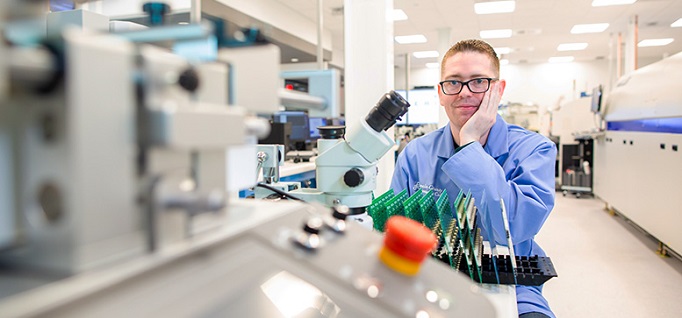Rocket speed to a new career
By Leigh Keeton
April 20, 2021
Taking a chance on a degree program leads to big opportunities.
When Chris Mariner decided it was time to start a new career, he was scared.
“I was unhappy with the work, but it was my family’s main source of income,” says Mariner, who lives in Elyria, Ohio. “And I had grown quite comfortable with the job and the lifestyle it was able to provide.”
But Mariner, now 34, was looking into the associate of applied science in mechatronics technology – micro electromechanical systems (MEMS) program at Lorain County Community College. It was a new and exciting program, and its graduates were in high demand.
Mariner just had to believe in himself.
“Convincing myself I could do this and I deserved to give myself a chance was the largest barrier I had to break,” he says.
Absorbing it all
Mariner eased his way into the program, continuing to work his full-time job and taking one or two classes each semester. LCCC had designed the MEMS program similar to all its programs, making it affordable and accessible to working adults.
It didn’t take long though for Mariner to know he was in the right place and learning from the right instructor, Johnny Vanderford.
“Johnny teaches the material so well and with such enthusiasm, his students begin to love and absorb all of the information so easily,” Mariner says.
Vanderford made it clear that the information Mariner was absorbing was exactly what local employers wanted him to know. At the start of nearly every class, Vanderford showed listings of available MEMS-related jobs at local companies. He then drilled down into the job requirements and drew direct correlations between those requirements and the daily lab or lecture.
“These were real life skills we were learning and knowledge that would be used throughout our careers,” Mariner says.
Breaking the barrier
While Vanderford taught Mariner the skillset he needed, Courtney Tenhover, program developer in the engineering, business and information technologies division, was networking with local companies and recruiters on Mariner’s behalf and helping him perfect his resume.
“By the end of my second semester, I got a well-paying internship, quit my job, and enrolled in classes full time,” he says. “I was ready to put all of my effort into this program.”
That internship was with Recognition Robotics, a technology company on the LCCC campus designing visual guidance sensors that communicate with robotics and automation equipment for industrial applications. The internship provided Mariner with experience in a range of tasks, including the first printed circuit board Mariner designed for a company.
“I will forever be thankful for my time at Recognition Robotics – it was invaluable and one of the main reasons my career was able to get started,” Mariner says.
Launching a new career
Mariner graduated in spring 2019 with his associate of applied science degree in MEMS and had job opportunities to choose from, including the one he ultimately accepted – electrical designer at Zin Technologies.
Two years in, Mariner is doing more than succeeding at Zin Technologies, a regional company that provides full lifecycle development of aerospace systems. He spent his first year designing circuit boards and then was promoted to process engineer. He is now developing and improving the company’s manufacturing processes for circuit boards being sent into space.
“It’s very exciting and each project is unique,” Mariner says. “I’m consistently seeing new things come up and processes can always be improved.”
Mariner has come a long way in a short time, and says he is still in awe of his career transformation.
“I went from working retail, to designing circuit boards going into outer space in less than two years,” he says. “Not a whole lot of people can say that.”
This article originally appeared in CC Daily.



